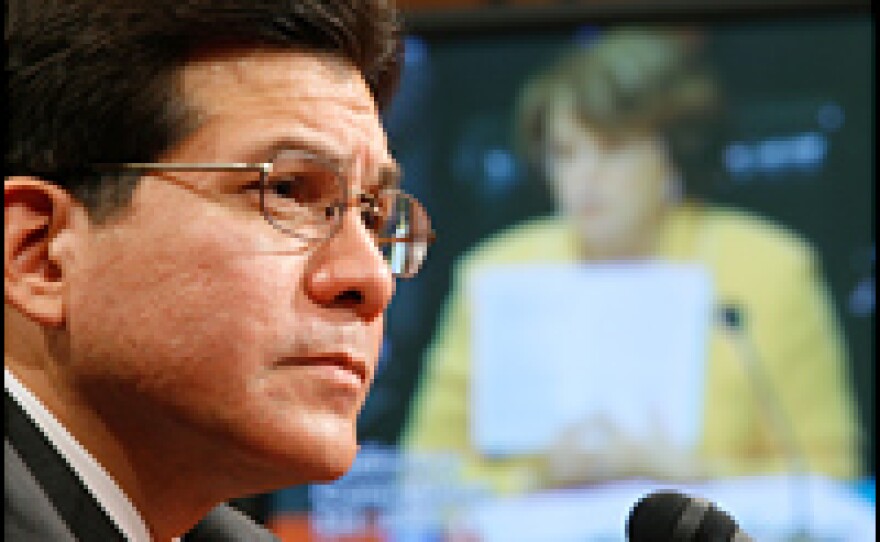It has been three months since Attorney General Alberto Gonzales last testified before the Senate Judiciary Committee. Back then, senators seemed to almost feel sorry for him. Tuesday's appearance was starkly different: Sitting before the committee this time around, Gonzales was attacked from all sides.
Bipartisan Assault
"The attorney general has lost the confidence of the Congress and the American people," said Committee Chairman Patrick Leahy (D-VT). He said the Justice Department was now "shrouded in scandal."
"I don't trust you," Leahy told Gonzales.
The panel's ranking Republican, Sen. Arlen Specter (PA), was no gentler. "Is your department functioning?" he asked the attorney general.
Sen. Herbert Kohl (D-WI) went a step further. "What keeps you in your job, Mr. attorney general?" he asked.
Gonzales seemed unaffected by the onslaught. "I have decided to stay and fix the problem, and that's what I have been doing," he told Kohl.
Many of those problems are of Gonzales' own making. Senators are furious over inconsistencies in his testimony on various issues and his evasive answers to their questions.
Case in point: Months ago, Gonzales said under oath that there had been no serious disagreement in the Justice Department about President Bush's domestic spying program.
It later came out that there had been heated exchanges over the program. In May, former Deputy Attorney General James Comey told the committee that there had been a major disagreement over the program in 2004, when Gonzales was White House counsel.
The Hospital Visit
At the time, then-Attorney General John Ashcroft was in the hospital for an operation, and Comey was acting attorney general. Comey was against renewing the surveillance program and told Gonzales as much.
Gonzales, with then-White House Chief of Staff Andrew Card, went to Ashcroft's hospital room and tried to get him to overrule Comey and reauthorize the spying program. Ashcroft refused.
Specter asked Gonzales, given Comey's version of events, how Gonzales could say there had been no disagreement about the program. Gonzales said that the visit to the hospital was not about the terrorist surveillance program but rather, about other intelligence activities.
The sentence had barely left Gonzales' mouth when Specter jumped in, "Mr. attorney general, do you really expect us to believe that?"
Gonzales said that he went to Ashcroft's hospital room to get the surveillance program reauthorized only after top Republicans and Democrats from the House and Senate said they supported the program.
"We had had an emergency meeting in the White House situation room, where the congressional leadership told us to continue going forward with this very important intelligence activity," he told the committee.
Gonzales said he had gone to Ashcroft's hospital room to let him know where the leadership stood on the issue. He hadn't gone there to pressure him.
A Looming Showdown Between Congress, White House
Although domestic spying was a major focus of Tuesday's hearing, it was not the only issue.
California Democrat Sen. Dianne Feinstein began her questing by opening a manual. It was the newly revised Justice Department manual on prosecuting voter-fraud cases. The old version of the book had sections barring prosecutions that could affect an election. The new version, as Feinstein read it aloud, eliminates or waters down those provisions. Gonzales said he didn't know about the changes.
Specter also raised the issue of the looming showdown between the White House and Congress over whether top administration officials can be compelled to testify about U.S. attorney firings and other matters.
The Bush administration has claimed that executive privilege protects the officials from having to testify. Congress says that the conversations among executive branch officials aren't privileged. More recently, the White House has suggested that federal prosecutors in Washington, D.C., won't enforce contempt charges against the officials if Congress seeks them.
"If that is to happen," Specter said, "the president can run the government as he chooses, answer no questions, say it's executive privilege. You can't go to court, and the president's word stands."
That clearly wouldn't do, Specter said. He suggested that Gonzales ask the solicitor general to appoint a special prosecutor. Gonzales has recused himself from that issue.
Copyright 2022 NPR. To see more, visit https://www.npr.org. 9(MDAzMjM2NDYzMDEyMzc1Njk5NjAxNzY3OQ001))








